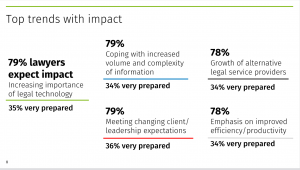According to Wolters Kluwer 2022 Future Ready Lawyer Report, lawyers turn to legal tech to overcome challenges around efficiency, compliance, higher performance expectations, retaining talent and ESG.

Helena Hallgarn, VQ, participated in a webinar on 13 October to discuss this report together with Patricia Manca Diaz, Partner at PCW Tax & Legal Services, Marcus Schmitt, General Manager at ECLA and Ambassador of ELTA and Jeroen Zweers, Founder of Noun.Legal and Vice President and Ambassador of ELTA. Moderator was Grégoire Miot, BD Associate Director Europe & Evangelist at Wolters Kluwer and Treasurer and Ambassador of ELTA.

A clear trend in this report is the great expectation of how tech can support lawyers for the future – to cope with increased volume and complexity of information, growth of alternative legal service providers and increase productivity – combined with the awareness of not being sufficiently prepared to handle this this new tech. Four out of five lawyers expect legal technology to be of increasing importance, but only one third feel very prepared for this.
 Corporate legal departments, that are the important customers to the big law firms, handle this by expecting more from their law firms, expecting them to use technology to deliver better results. The responsibility to use legal technology efficiently can this way partly be shifted to law firms. Still, inhouse lawyers also continue to increase their investments in legal software and overall technology. The big stress among these lawyers gets obvious when 81% of the legal departments state that robotic process automation will have most impact when, at the same time, fewer than 37% understand any of these technologies very well. Does this mean that inhouse lawyers believe they need to have further knowledge about robotic process automation technologies?
Corporate legal departments, that are the important customers to the big law firms, handle this by expecting more from their law firms, expecting them to use technology to deliver better results. The responsibility to use legal technology efficiently can this way partly be shifted to law firms. Still, inhouse lawyers also continue to increase their investments in legal software and overall technology. The big stress among these lawyers gets obvious when 81% of the legal departments state that robotic process automation will have most impact when, at the same time, fewer than 37% understand any of these technologies very well. Does this mean that inhouse lawyers believe they need to have further knowledge about robotic process automation technologies?
The point here is that we must adapt the tech skills and competence needed for lawyers in general. Naturally lawyers need to develop their skills to use a tool like Word but they do not have to understand the technology behind. The same goes with other kinds of tool, even if it is built on an AI solution.
The idea that lawyers in general need to understand complicated technology only creates a lot of stress. During the webinar panelists and several participants agreed on the need for better training already in the university with changes in the education of lawyers. Naturally, more knowledge is never wrong, but is this really the solution for this problem?
For example, in the banking industry and in the medical industry there are several new services launched, services such as Revolut, Klarna, “yourdoctors-online” etc. and the threshold for using them is quite low. Are these big changes in the banking industry and in the medical industry a result of more education in technology for people working in those sectors? Is it more focus on tech in the medical training that has helped the development of new online medical services and new alternative ways of treating patients? Is it more focus on tech in the training of people getting into the banking industry that has helped the development of new online banking solutions and new ways of managing your banking business? Probably not.
Instead, we have people within those industries taking a new path focusing on building new solutions. These people might focus on better knowledge in IT, project management, process analysis etc. and learn how to collaborate with people from other professions. The point here is that what we probably need is a new breed of lawyers focusing on business development, tech etc. Instead of focusing on a specialist area such as competition law or labor law, these lawyers could focus on tech development, i.e. we can develop different career path for Competition lawyers and Legal Tech lawyers etc. These new Legal Tech lawyers could learn more about technology and focus on working with supporting the development of new legal services and solutions. The author and Professor Richard Susskind predicted this already in 1996 in his book “The future of law” where he mentioned the need for new types of lawyers such as for example Legal Knowledge Engineers.
In Scandinavia we can see a great interest for new such roles among big law firm, where they have employed Innovation Managers, Head of Digital and Innovation, Head of Legal Tech, Legal Tech Associates etc.
If we have a career path for Legal Tech lawyers, with a more profound knowledge of different kinds of technology, these lawyers can hopefully see the possibilities with new kinds of services and tools in the legal industry. That way we might see new offerings giving also inhouse counsels better options for using tech.
Therefore, instead of trying to teach all lawyers more about tech, I would propose specialized university courses for lawyers, for those interested in a path as Legal Tech lawyer. That way we can give these lawyers the knowledge needed for developing new tools and services in the legal industry.

